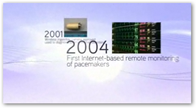I guess it’s Mr. Grassley again here who may have clout but doesn’t understand the role of Health IT and the FDA itself is in the midst of getting up to date with technology themselves! This goes back to what I have been saying for 2 years here, non participants don’t get it.
Wireless Healthcare Medical Devices and the FDA – The Reasons They Are Slow to Come to Terms
This is a whole new open territory for the FDA and as I have mentioned before as late as 2008, all the investigators and analysts didn’t have computers, but all that aside, how is wireless going to be approved by the FDA. This is a tricky one to say the least, not tricky per se in what it does  but they also have to make sure the data is going in the right direction.
but they also have to make sure the data is going in the right direction.
FDA Trying to Figure Out Web 2.0 – Public Hearings in November on Tweet Patrol and Other Social Networks along with Advertising Guidelines
To further substantiate the resources of the FDA, they didn’t have enough resources to start their new Sentinel data program and had to give a grant to an insurance company (who most have invested heavily in technology) to help them out.
FDA Awards a Big Grant to Health Insurance Company For Pilot Program To Monitor Safety of Drugs and Medical Devices
Don’t get me wrong here on the technology side, but you have to have the IT resources or build them quickly to step into a position like this, again non participants without some IT understanding may get confused on such issues.
Also I have talked about Behavioral Health care and Pilgrim, under written by Vintage Financial Services, is right up there in that area of focus as well and safety and behavioral health are somewhat going hand in hand today, biometric monitoring and other related items.
There was not enough detail given on how the pilot program will in fact function with the Sentinel data system of the FDA to really go much further here and I do in fact hope that it is the data that is used by the “experts” at the FDA and not a reliance on a health insurance company’s program to run the program entirely and have the authority to here, as we all will suffer if this occurs and shareholders may receive larger dividends.
Promising new startup of 2009 - Executive branch of the US federal Government
The Executive branch of our government is working overtime to bring infrastructure up to date and hats off in that effort by all means, but again we need to look at where the resources lie and WHO IS CAPABLE of providing the data services needed to build a reporting structure. The FDA is not to blame as they had a leader who was also in “tech denial” too for a number of years, so with leadership who does not participate, that’s what you end up with.
If some of our fine leaders would participate in their own healthcare and experience what is out there it would really stand to make a huge difference. A year ago in the Senate Finance committee testimonies, most all sat there with no clue on the value of a personal health record or what it was, as a simple example and I hope knowledge has grown since that time, but I shuddered at watching “their” video on the web that showed complete lack of participation themselves as “patients”. Anybody in the House or Senate using one of these?
Last but not least the most compelling reason I could find for not having the FDA regulate Health IT from April of 2009:
Hospital MRI and Other Medical Devices Infected with Conficker Virus – FDA Required 90 Day Notice before Windows Update Patch Could be Applied
Case closed on this idea. BD
Sen. Charles Grassley (R-Iowa), who is investigating the safety of health information technology, appears to be interested in exploring whether the Food and Drug Administration should regulate such products.

Grassley has sent letters to Health and Human Services Secretary Kathleen Sebelius, and H. Stephen Lieber, CEO at the Healthcare Information Management and Systems Society, asking for the organizations' views on a position paper that discussed whether clinical software should be regulated. The paper was published in the Journal of the American Medical Informatics Association in 1997. That paper spurred lengthy consideration within the FDA, which ultimately declined to regulate clinical systems amid strong industry opposition.
Grassley has considerable legislative clout as the ranking member--the leading Republican--on the Finance Committee. Last October, he sent letters to 10 health I.T. vendors asking how they handle complaints of faulty software and whether clauses in their contracts prohibit providers from discussing flaws with third parties, or shield vendors from liability for harm that results from the use of I.T. Grassley sent a similar letter in January to 31 hospitals or delivery systems.
Should FDA Regulate Health I.T.?



0 comments :
Post a Comment